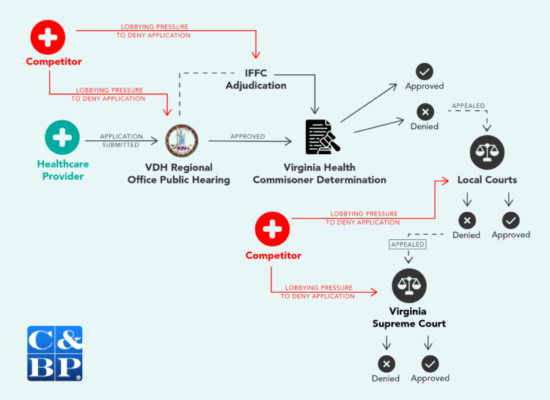Sentara Healthcare used the convoluted COPN system to attempt to stop a rival from opening an open-heart surgery center
Few issues have inspired unanimity from the last five presidential administrations, Democratic and Republican, more than the need to repeal the system Virginia and other states use to permit hospitals to add or subtract services.
Virginia’s health commissioner must approve Certificate of Public Need (COPN) requests from health care providers for 19 different categories of services. The result, as depicted here, is a gantlet of steps that can impede competition and invite rivals to subvert some providers’ attempts to broaden their range of services.
In March 2019, Norfolk Circuit Presiding Judge Mary Jane Hall approved granting Sentara standing to challenge Chesapeake Regional Medical Center’s COPN application to open an open-heart surgery center. The case has been appealed to the Virginia Supreme Court.
We’re probing how Sentara, as a $6B health care giant that enjoys nonprofit, tax exempt status, uses extensive lobbying and influence to crush competitors, the lengths they are going to do that, and the impacts on average citizens.
Do you have information to share? Send us a note through our confidential tip line.
Ray Locker is enterprise and investigative editor of Checks and Balances Project, an investigative watchdog blog holding government officials, lobbyists, and corporate management accountable to the public. Funding for C&BP is provided by Renew American Prosperity and individual donors.
You may also want to read:
5 Things To Know About Certificate of Public Need Laws
Judge Ruled for Sentara, Once Represented the Company with Sentara’s Lawyer







Recent Comments